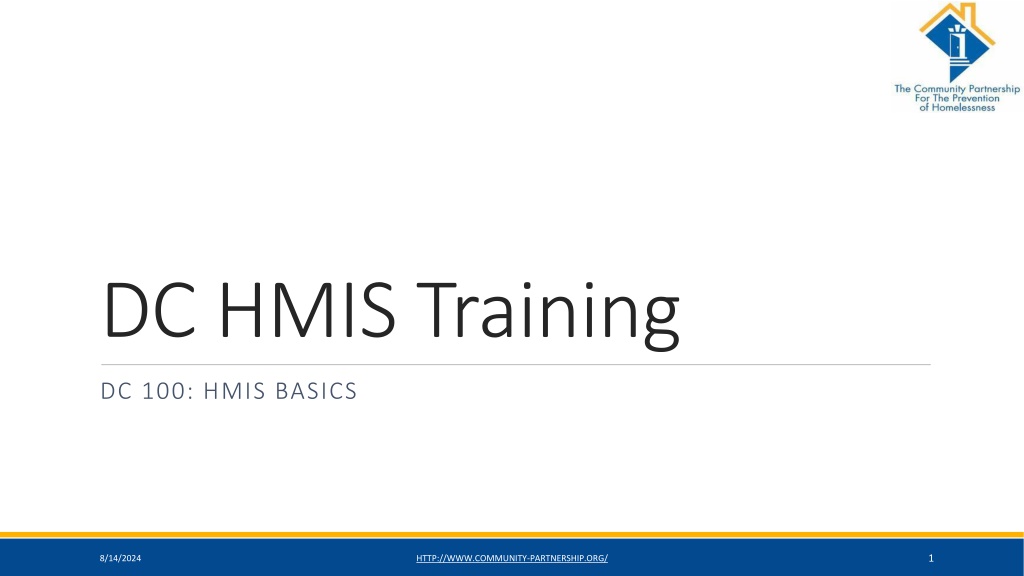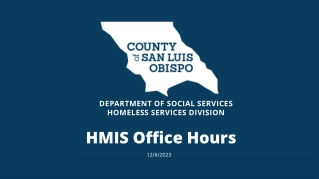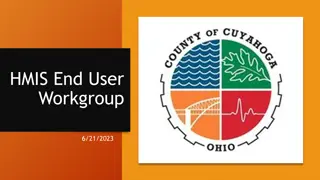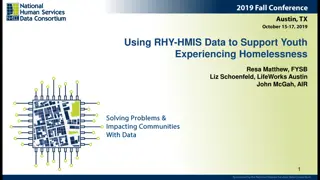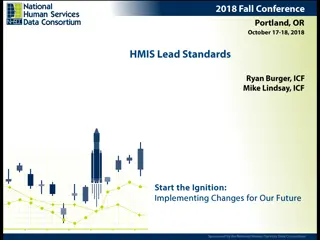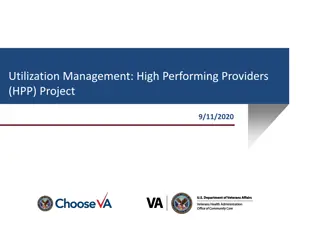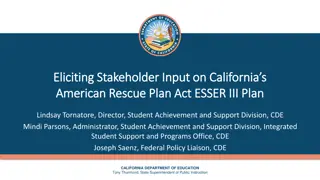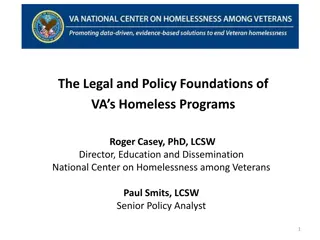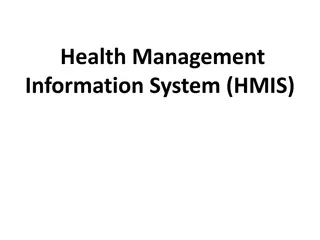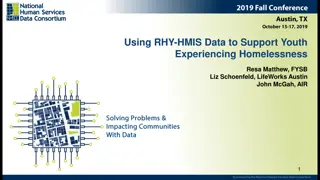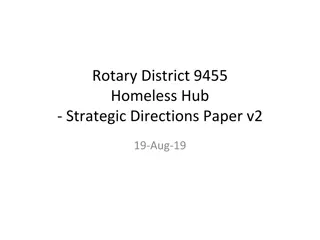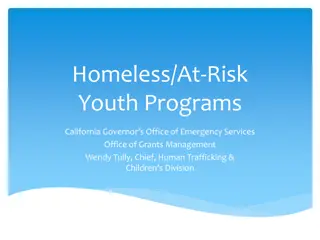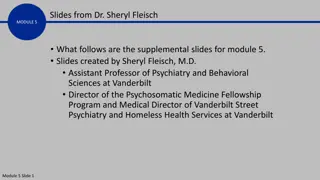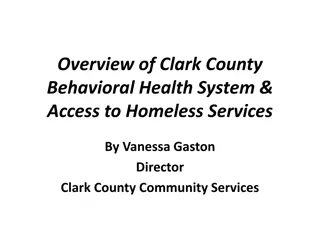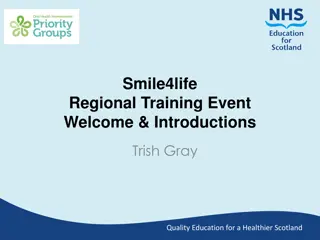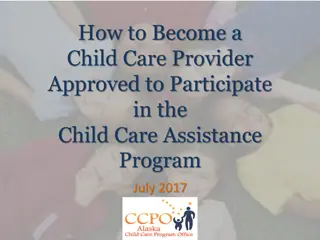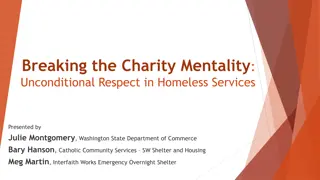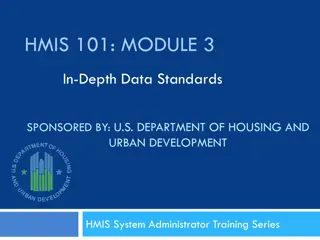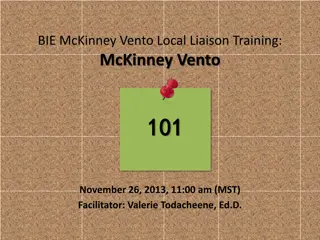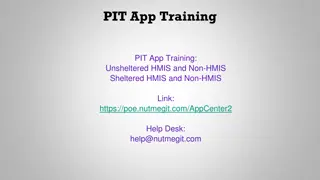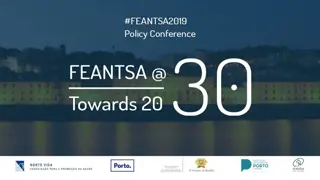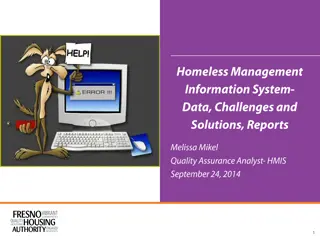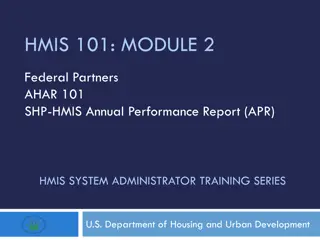Understanding DC HMIS Training for Homeless Services Providers
Explore the DC HMIS Training covering basics, data security, participant roles, agency responsibilities, data entry standards, system login procedures, support resources, and common HMIS terms. Learn about the significance of HMIS in tracking services, case plans, assessments, and housing for homeless clients in the District of Columbia. Discover the essential role of lead agencies and funders in ensuring data accuracy, system functionality, and grant compliance. Participate in this vital system to enhance homeless response efforts.
Download Presentation

Please find below an Image/Link to download the presentation.
The content on the website is provided AS IS for your information and personal use only. It may not be sold, licensed, or shared on other websites without obtaining consent from the author. Download presentation by click this link. If you encounter any issues during the download, it is possible that the publisher has removed the file from their server.
E N D
Presentation Transcript
DC HMIS Training DC 100: HMIS BASICS 1 8/14/2024 HTTP://WWW.COMMUNITY-PARTNERSHIP.ORG/
Agenda What is HMIS? Who can see what? Visibility Data Security Who Participates? What is expected of you/your agency? Agency Admin Data Entry 2020 Data Standards Changes Logging into the system Password Resets Timeliness Universal Data Elements Help and Support Helpdesk System News Trainings Common HMIS Terms HTTP://WWW.COMMUNITY-PARTNERSHIP.ORG/ 2 8/14/2024
Homeless Management Information System Tool required by funders of homeless services providers What is HMIS? Way to keep track of services, case plans, assessments, and housing for clients Way for community to learn of system flow and cracks in our homeless response system This is all thanks to YOU for completing accurate and timely data entry for the clients you serve! HTTP://WWW.COMMUNITY-PARTNERSHIP.ORG/ 3 8/14/2024
ServicePoint DCs HMIS Software HTTP://WWW.COMMUNITY-PARTNERSHIP.ORG/ 4 8/14/2024
Agencies that receive Federal and District funding: HUD CoC HUD ESG HUD VASH HUD HOPWA HHS RHY HHS PATH VA SSVF VA GPD DHS Sole Source DHS Management DHS Direct TCP Direct Who Participates? Agencies who provide services to homeless individuals and families within the District of Columbia - you do not need to be in the list above to participate! HTTP://WWW.COMMUNITY-PARTNERSHIP.ORG/ 5 8/14/2024
Funder vs Lead Agency LEAD AGENCY (THE COMMUNITY PARTNERSHIP) FUNDER (DHS, HUD, VA, TCP) Provides agencies grants to be able to serve clients Ensures the HMIS is functional and up to date Ensures agencies are correctly entered into HMIS Requires the use of HMIS as part of the grant agreement Monitors for data quality, both at the system level and at the funding level. Works with the Lead Agency to ensure their grantees are entering into HMIS and that they receive the reports required for system analysis and grant competitions Answers HMIS related questions through the helpdesk Provides trainings to users of the HMIS Provides reports to Funders and the Continuum of Care (CoC) as a whole Fields programmatic and grant related questions HTTP://WWW.COMMUNITY-PARTNERSHIP.ORG/ 6 8/14/2024
Have a designated Agency Admin for your Agency. Agency Admins keep the Lead Agency updated on: User changes Project changes Ensure users go to training Funding changes What is expected of you/your agency? Users go through training, both initially and when asked to by the Lead Agency Complete accurate and timely data entry The minimum requirement for any agency/program entering into HMIS are the Universal Data Elements. Data Quality reports are an important way to ensure accurate data entry, you are expected to use the data quality reports sent to you to make corrections to your data on at least a quarterly basis. Timely data entry allows for our system to function. For data entry into HMIS, timely is within 48 hours HTTP://WWW.COMMUNITY-PARTNERSHIP.ORG/ 7 8/14/2024
HMIS - already covered Lead Agency already covered Agency Admin already covered CoC CAHP Provider Project Type Units/Beds Workflow Assessments and Sub-assessments Universal Data Elements (UDEs) Common Data Elements Funder Specific Data Elements ART Common HMIS Terms HTTP://WWW.COMMUNITY-PARTNERSHIP.ORG/ 8 8/14/2024
Continuum of Care (CoC) The Continuum of Care of DC is the group of agencies and people that are involved in and interested in the homeless response system within the geographic boundaries of the District of Columbia. The CoC is coordinated and managed through the CoC Board. This board is the DC Interagency Council on Homelessness s Executive Board. This board hears from the various committees to inform its decisions. The Continuum of Care makes such decisions as: The CoC s priorities for funding competitions, CAHP prioritization rules and policies Privacy and data sharing policies within HMIS The Strategic Plan for the Homeless Response System of DC HTTP://WWW.COMMUNITY-PARTNERSHIP.ORG/ 9 8/14/2024
Coordinated Assessment and Housing Placement (CAHP) Coordinated Assessment or Coordinated Entry is a process by which vulnerable people are prioritized for placement into housing programs. This is a community based process that is staffed by TCP. It is more than just the information within HMIS, but HMIS information plays a HUGE role in the process as it provides us Specialized CAHP training is provided to those who need to complete assessments and housing placements. DC s CAHP system is split into 4 sub groups Families Single Adults Youth Veterans HTTP://WWW.COMMUNITY-PARTNERSHIP.ORG/ 10 8/14/2024
Provider Provider is a term specific to HMIS software. It is how the information is organized in the database There are 3 main types of providers in our system Agency providers Program providers CAHP providers Provider Naming convention [Agency Name or Acronym] [Program Name] [Project Type Population] [Funding Source] (Provider ID#) TCP Chronic Homeless Initiative (CHI) 6 PSH IND HUD CoC(1736) HTTP://WWW.COMMUNITY-PARTNERSHIP.ORG/ 11 8/14/2024
Project Types Project Types are classifications of what your program or programs do. Here are the categories your program will fit into: Homelessness Prevention (HP) Permanent Supportive Housing (PSH) Street Outreach(SO) Permanent Housing with Services (PH-S) Emergency Shelter(ES) Permanent Housing Housing Only (PH-HO) Safe Haven (SH) Coordinated Entry (CE) Transitional Housing (TH) Day Shelter (DS) Rapid Re-housing (RRH) Supportive Services Only (SSO) Transitional Housing/Rapid Re-housing joint project (TH/RRH) Other(Other) HTTP://WWW.COMMUNITY-PARTNERSHIP.ORG/ 12 8/14/2024
Project Definitions part 1 Homelessness Prevention (HP): A project that offers services and/or financial assistance necessary to prevent a person from moving into an emergency shelter or place not meant for human habitation. Street Outreach(SO): A project that offers services necessary to reach out to unsheltered homeless people, connect them with emergency shelter, housing, or critical services, and provide urgent, non-facility-based care to unsheltered homeless people who are unwilling or unable to access emergency shelter, housing, or an appropriate health facility. Only persons who are "street homeless should be entered into a street outreach project. Projects that also serve persons other than street homeless must have two separate projects to be set up in HMIS, one 'Street Outreach' and the other 'Services Only.' Emergency Shelter(ES): A project that offers temporary shelter (lodging) for the homeless in general or for specific populations of the homeless. Requirements and limitations may vary by program, and will be specified by the funder. Safe Haven(SH): A project that offers supportive housing that (1) serves hard to reach homeless persons with severe mental illness who came from the streets and have been unwilling or unable to participate in supportive services; (2) provides 24-hour residence for eligible persons for an unspecified period; (3) has an overnight capacity limited to 25 or fewer persons; and (4) provides low demand services and referrals for the residents. (DC currently DOES NOT have any Safe Havens) HTTP://WWW.COMMUNITY-PARTNERSHIP.ORG/ 13 8/14/2024
Project Definitions part 2 Transitional Housing (TH): A project that provides temporary lodging and is designed to facilitate the movement of homeless individuals and families into permanent housing within a specified period of time, but no longer than 24 months. Requirements and limitations may vary by program, and will be specified by the funder. Rapid Re-housing (RRH): A permanent housing project that provides housing relocation and stabilization services and short- and/or medium-term rental assistance as necessary to help a homeless individual or family move as quickly as possible into permanent housing and achieve stability in that housing. Permanent Supportive Housing (PSH): A project that offers permanent housing and supportive services to assist homeless persons with a disability (individuals with disabilities or families in which one adult or child has a disability) to live independently. Permanent Housing with Services(PH-S): A project that offers permanent housing and supportive services to assist homeless persons to live independently, but does not limit eligibility to individuations with disabilities or families in which one adult or child has a disability. Permanent Housing Housing Only(PH-HO): A project that offers permanent housing for persons who are homeless, but does not make supportive services available as part of the project. HTTP://WWW.COMMUNITY-PARTNERSHIP.ORG/ 14 8/14/2024
Project Definitions part 3 Coordinated Entry(CE): A project* that administers the continuum's centralized or coordinated process to coordinate assessment and referral of individuals and families seeking housing or services, including use of a comprehensive and standardized assessment tool. *This is not a project in the traditional sense as it may more accurately reflects a system or process, but project is used because that is how data is typically collected in HMIS. Day Shelter(DS): A project that offers daytime facilities and services (no lodging) for persons who are homeless. Supportive Services Only(SSO): A project that offers only stand-alone supportive services (other than outreach or coordinated entry) to address the special needs of participants (such as child care, employment assistance, and transportation services) and has associated housing outcomes. Other: A project that offers services, but does not provide lodging, and cannot otherwise be categorized as another project type, per above. Any project that provides only stand-alone supportive services (other than outreach or coordinated entry) and has no associated housing outcomes should be typed as 'Other.' HTTP://WWW.COMMUNITY-PARTNERSHIP.ORG/ 15 8/14/2024
Units/Beds The number of spaces available within a housing program for serving clients. The use of units is typically for Families where there are multiple beds within a unit. How many families are you able to serve in your program will get your number of units. The average family size will give us the number of beds in your program. For singles, the units and the beds are the same number how many people are you able to serve? For rapid rehousing, this number can fluctuate. HTTP://WWW.COMMUNITY-PARTNERSHIP.ORG/ 16 8/14/2024
Workflow A Workflow is how you enter data into HMIS. There are 4 main workflows in DC s HMIS: Entry/Exit Workflow Used by the majority of programs. Uses the ClientPoint module in ServicePoint for most data entry. ShelterPoint Workflow Used by Low Barrier and Severe Weather Shelters. Uses the ShelterPoint module in ServicePoint for most data entry. SkanPoint Workflow Used by Outreach and Day Shelters. Uses the SkanPoint module in ServicePoint for most data entry. Case Plans Used by case managers. Uses the ClientPoint module in ServicePoint. Trainings are split up by type of workflow. HTTP://WWW.COMMUNITY-PARTNERSHIP.ORG/ 17 8/14/2024
Assessments and Sub-assessments Assessments are the groups of questions that are to be answered by the client. These assessments include text boxes, drop down options, date fields, and sub-assessments. Sub-assessments are mini assessments found within assessments where we are able to track changes to answers over time and different types of subordinate answers within an overall answer. Example of Changes over time Income Example of Subordinate types within an overall answer Disability types or Veteran service locations HTTP://WWW.COMMUNITY-PARTNERSHIP.ORG/ 18 8/14/2024
Universal Data Elements (UDEs) Universal Data Elements are those questions that are REQUIRED for ANY program that enters into HMIS, regardless of funding source. HUD has required a set of data elements and DC has also required a set of data elements, so these two lists combined is the complete set of information required of ANY program entering into DC s HMIS. The next slides list the Universal Data elements as of 10/1/2019. HTTP://WWW.COMMUNITY-PARTNERSHIP.ORG/ 19 8/14/2024
HUD UDEs UNIVERSAL IDENTIFIERS (ONE ANSWER PER CLIENT RECORD) Name UNIVERSAL PROJECT STAY ELEMENTS (ONE OR MORE VALUES PER PROJECT STAY) Disabling Condition (Yes/No) Name Data Quality Project Start Date Social Security Number Project Exit Date Social Security Number Data Quality Destination Date of Birth Relationship to Head of Household Date of Birth Data Quality Race Client Location Housing Move in Date (for RRH and Permanent Housing projects) Ethnicity Gender Veteran Status Prior Living Situation HTTP://WWW.COMMUNITY-PARTNERSHIP.ORG/ 20 8/14/2024
DC UDEs Veteran Information Client Contact Information Engaged with Case Management? Client Identification Information Primary Reason for Homelessness Last Grade Completed Sexual Orientation Client Education Information Foster Care Language Access Questions Institutionalization Zip Code of Last Permanent Address HTTP://WWW.COMMUNITY-PARTNERSHIP.ORG/ 21 8/14/2024
Common Data Elements These are data elements that MOST funders require for their grants and contract holders. Income and Sources Non-Cash Benefits Health Insurance Disability sub-assessment Domestic Violence Current Living Situation Date of Engagement HTTP://WWW.COMMUNITY-PARTNERSHIP.ORG/ 22 8/14/2024
Program Specific Data Elements These are the data elements that are only required by certain funders or for certain project types. We will have user guides available in the coming month that details the funder specific data element for each funding source. HTTP://WWW.COMMUNITY-PARTNERSHIP.ORG/ 23 8/14/2024
ART ART stands for the Advanced Reporting Tool and is the primary reporting location for DC s HMIS It contains many reports, including Data Quality reports Custom program management reports Client detail reports HTTP://WWW.COMMUNITY-PARTNERSHIP.ORG/ 24 8/14/2024
The database contains hundreds of thousand client files, each with dozens of project stays, services, and case notes. Who Can See What? Having a visibility structure is important to ensure client information is protected, while also ensuring agencies and programs are able to work together to help clients. Visibility and Data Security Client choice to share their program level information is at the heart of our visibility structure. HTTP://WWW.COMMUNITY-PARTNERSHIP.ORG/ 25 8/14/2024
Visibility Basics Old Structure Agency B Agency A FRSP Program 1B Program 2B Program 3B Agency A FRSP Agency B FRSP Agency C FRSP Program 1A Program 2A Program 3A HTTP://WWW.COMMUNITY-PARTNERSHIP.ORG/ 26 8/14/2024
Visibility Basics Current Structure DC s Lead Agency Agency A Agency B Program 1A Program 2A Program 1B HTTP://WWW.COMMUNITY-PARTNERSHIP.ORG/ 27 8/14/2024
HUD UDEs Whats Shared & What Isnt UNIVERSAL IDENTIFIERS (ONE ANSWER PER CLIENT RECORD) Name UNIVERSAL PROJECT STAY ELEMENTS (ONE OR MORE VALUES PER PROJECT STAY) Disabling Condition (Yes/No) Name Data Quality Project Start Date Social Security Number Project Exit Date Social Security Number Data Quality Destination Date of Birth Relationship to Head of Household Date of Birth Data Quality Race Client Location Housing Move in Date (for RRH and Permanent Housing projects) Ethnicity Gender Veteran Status Prior Living Situation HTTP://WWW.COMMUNITY-PARTNERSHIP.ORG/ 28 8/14/2024
Coming Soon: Universal ROIs There is not currently a standard ROI for the CoC but that is being worked on. Once more information is available we will update you all on this new document and the processes involved. HTTP://WWW.COMMUNITY-PARTNERSHIP.ORG/ 29 8/14/2024
Data Security Keeping client information safe and secure begins with YOU! Do not let others log in as you. Keep your user name and password to yourself. Do not keep it posted anywhere others can see Do not leave your computer unattended while logged into ServicePoint. Do not save your login information with your web browser. Do not send client identifying information via unencrypted emails (including to the helpdesk!) Client Identifying information includes: Name Date of Birth Social Security Number HTTP://WWW.COMMUNITY-PARTNERSHIP.ORG/ 30 8/14/2024
2020 Data Standards Changes These changes went into effect on October 1st, 2019 We have updated the assessments in HMIS to contain the current required questions. We are in the process of updating reports in ART for data quality reports. HTTP://WWW.COMMUNITY-PARTNERSHIP.ORG/ 31 8/14/2024
Universal Data Element Changes Prior Living Situation Formerly named Living Situation Picklist now aligns with Destination and Current Living Situation Wording change to Emergency shelter, including hotel or motel paid for with emergency shelter voucher, or RHY-funded Host Home shelter Addition of Host Home (non-crisis) Wording change to Rental by client, with RRH or equivalent subsidy Wording change to Rental by client, with HCV voucher (tenant or project based) Wording change to Rental by client in a public housing unit Data Entry Implications: New and changed options moving forward Destination Picklist now aligns with Prior Living Situation and Current Living Situation Wording change to Emergency shelter, including hotel or motel paid for with emergency shelter voucher, or RHY-funded Host Home shelter Addition of Host Home (non-crisis) Wording change to Rental by client, with RRH or equivalent subsidy Wording change to Rental by client, with HCV voucher (tenant or project based) Wording change to Rental by client in a public housing unit Added Dependent A text box for Other Data Entry Implications: New and changed options moving forward Sexual Orientation Added picklist value Questioning/unsure Other Text box for Other HTTP://WWW.COMMUNITY-PARTNERSHIP.ORG/ 32 8/14/2024
Program Specific Element Changes Developmental Disability and HIV/AIDS Within the Disabilities Sub-assessment Removed the dependent element Substantially impedes the individual s ability to live independently Data Entry Implications: PATH Status For PATH Providers onky Added picklist value to No for Client Enrolled in PATH Unable to locate client Employment Status Data Entry now required for VA GPD Low Demand Data Entry now required for VA GPD Case Management/housing relocation One fewer question to answer for these two elements Domestic Violence Data Entry now required for SSVF Data Entry now required for PATH HTTP://WWW.COMMUNITY-PARTNERSHIP.ORG/ 33 8/14/2024
Program Specific Element Changes Pregnancy Status (RHY Providers) Data Element now required for ALL female Heads of Household regardless of age Previously only required for ADULT female Heads of Household HUD VASH Voucher Tracking Collection point changed from Project Start, Update, and Project Exit to Occurrence Point/Update. Current Living Situation Replaces Contact Required to be completed for each direct client contact for VAMC Station Number Data Entry now required for the following VASH - ALL Components Street Outreach VA-CRS Contract Residential Service Coordinated Entry (HUD CoC funded only) VA Community Contract SH Program Emergency Shelter Low Barrier and Severe Weather only Data is recorded for Heads of Household on each occurrence/update VA Grant Per Diem (GPD) ALL Components HTTP://WWW.COMMUNITY-PARTNERSHIP.ORG/ 34 8/14/2024
SSVF Specific Element Changes VA Services Provided SSVF Added new picklist values Rapid Resolution Project Each SSVF grantee will have a new program provider for Rapid Resolution This provider will have an Entry/Exit Workflow The provider will have a special assessment for the Rapid Resolution conversation you should be having with each veteran. Extended shallow subsidy Returning home Rapid Resolution VA Financial Assistance SSVF Added picklist value Extended shallow subsidy rental assistance This assessment will include Coordinated Entry Event The VA has given HMIS Lead Agencies and SSVF grantees a deadline of 12/1/19 to get this new project into HMIS. HTTP://WWW.COMMUNITY-PARTNERSHIP.ORG/ 35 8/14/2024
Logging into the System And now that you know all that, it s time to log into ServicePoint and begin your HMIS journey HTTP://WWW.COMMUNITY-PARTNERSHIP.ORG/ 36 8/14/2024
Logging In Training site: https://sp5.servicept.com/ washdc_demo/ Live site: https://washdc.servicept.com HTTP://WWW.COMMUNITY-PARTNERSHIP.ORG/ 37 8/14/2024
Logging In Training site: https://sp5.servicept.com/ washdc_demo/ Live site: https://washdc.servicept.com Forgot your password? Click here! HTTP://WWW.COMMUNITY-PARTNERSHIP.ORG/ 38 8/14/2024
Helpdesk: hmis@community-partnership.org Email the helpdesk with questions and we will provide answers and resources. We respond within 2 business days. Help and Support Trainings: We hold HMIS trainings every month. They are open to all, new user, seasoned veteran, or anywhere in between Training eventbrites are found at http://community- partnership.org/providers/training Have questions about the trainings? Email the helpdesk! Helpdesk System News Trainings HTTP://WWW.COMMUNITY-PARTNERSHIP.ORG/ 39 8/14/2024
System News We are using System News to alert Users to changes in the system, as well as scheduled system down time. We will also be populating it with other resources so stay tuned HTTP://WWW.COMMUNITY-PARTNERSHIP.ORG/ 40 8/14/2024
Thanks for participating! Questions? HMIS Help-Desk Email: hmis@community-partnership.org HTTP://WWW.COMMUNITY-PARTNERSHIP.ORG/ 41 8/14/2024
